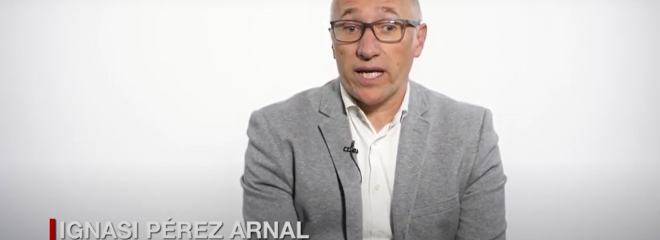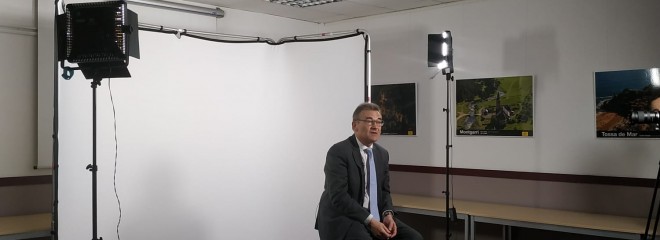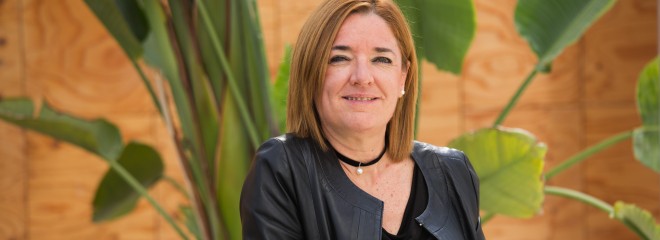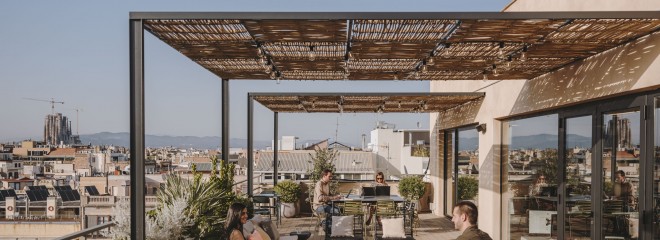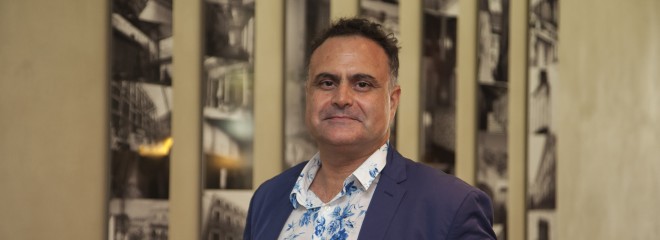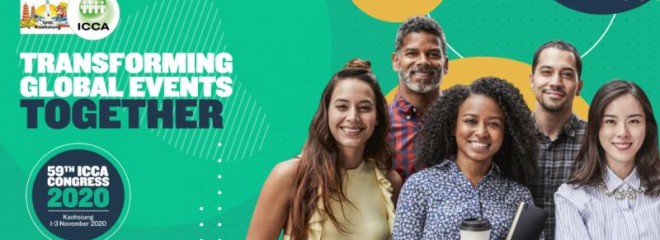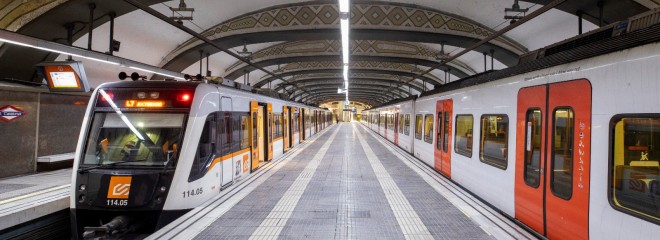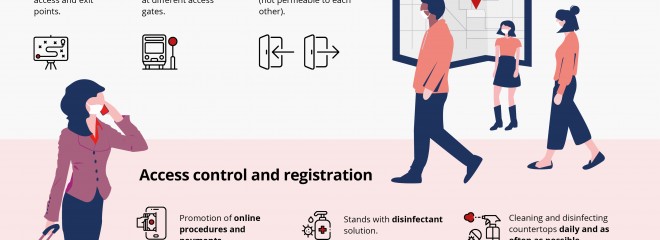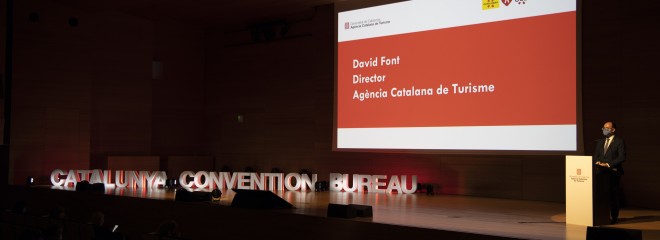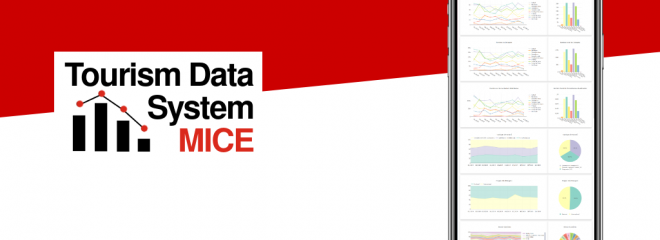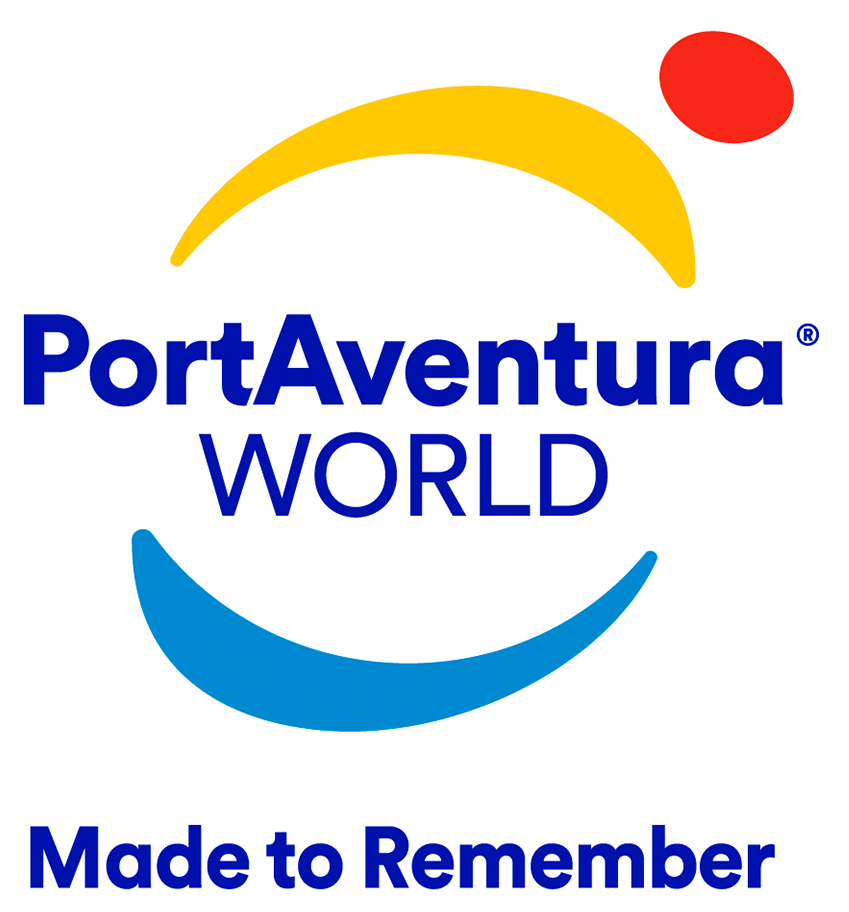The recovery of congresses: REBUILD
A conversation about the recovery and transformation of congresses with the Catalonia Ambassador Ignasi Pérez Arnal, CEO of BIM Academy and congress director of Rebuild, the first face-to-face event after the state of alarm. Around 5000 professionals, more than 180 exhibitors and 260 experts gathered during three days at the Barcelona International Convention Centre (CCIB) to participate at the National Congress of Architecture 4.0 and Advanced Construction, a space to discover new materials, the latest emerging technologies and the most innovative construction systems.
Catalonia: ready for a new era of congresses
What will the future of congresses look like? What offers Catalonia? Are Catalan venues ready for hybrid events? We talk with four Catalonia Ambassadors about new opportunities and challenges of the recovery and transformation of MICE.
Catalonia is talent, innovation, expertise, professionalism…
Women in science, conversation with Catalonia Ambassador Dr Teresa Mogas
Dr Teresa Mogas Amorós is professor at Department of Animal Medicine and Surgery, Veterinary Faculty of Autonomous University of Barcelona, and Special Graduate Faculty of Ontario Veterinary College at University of Guelph (Canada). Mogas Amorós is Ambassador of the Catalunya Convention Bureau and Board secreatary of the Association of Embryo Technology in Europe (AETE).
Dr Teresa Mogas organised the 32nd Scientific Meeting in 2016. What lessons did you learn from leading an international event of these characteristics?
I realised the importance of being very clear about the initial approach to how you want to organise a conference in order for it to run smoothly. The potential expectations and needs that conference speakers, participants and also sponsors may have during the event must be taken into account from the very beginning. It is therefore extremely important to have a good team of people on the local organising committee as well as the help of a conference promotion agency so that everyone can jointly decide the best options on how to organise the various activities from both a scientific and social perspective.
What attributes would you highlight about Barcelona and Catalonia as conference venues?
Barcelona is one of the most visited cities in Europe for both tourists travelling for pleasure and people arriving for conferences, meetings or all manner of professional events. Barcelona is a city worth visiting, as is the rest of Catalonia, for various reasons and these include its architecture, climate, gastronomy, good transport links, range of hotels and also the charm and friendliness of its inhabitants. But these are not the only reasons. Its ability to host all manner of events and activities makes it a very attractive city for the world of culture and business. Apart from the event per se, organising a conference in Barcelona and the rest of Catalonia is a guarantee for its organisers and also for the enjoyment of the people attending.
How should future conferences be considered in order to promote gender equality in science and provide more visibility to the strategic role of women scientists?
Scientific associations have made an effort to seek gender parity among their members for both keynote presentations and brief talks. There are many women working in research and although they are not very well known at a social level, they are indeed the ones working daily and generating results in their laboratories. We must avoid the traditional cronyism of these scientific encounters, as this will undoubtedly make them more enriching.
What would you highlight about Catalonia when asked about the pairing of women and science?
The scientific field in health issues has traditionally had a special economic importance in Catalonia. It is also well known that this field is especially feminised in Europe, Spain and Catalonia. In other words, there are more women researching on these topics than men. Despite this situation, when prizes are awarded or prominent scientists are appointed, male names always appear. This is what is called the “Matilda effect”, or the invisibility of women’s work. Science is cooperation. Science is created in working groups. But the media ends up simplifying it and only puts the focus on one person, who usually happens to be a man.
How has the situation of women in the world of research evolved in your more than 25 years of research excellence?
The situation of women in the world of research has evolved a lot over the last 25 years as a result of the substantial incorporation of women into the world of research and we hope this trend will continue in the future. Even though there are increasingly more women leading research teams, departments and faculties in my university, and we have even had two women rectors, there is still a lack of parity in the scientific field. Women have for years been the majority of the university population at both undergraduate and postgraduate levels, but the presence of women is lower in the higher categories of professional careers, as is the percentage of women who manage to fill positions of influence and management in these institutions.
Catalonia, home to digital nomads
Barcelona’s status as the main digital hub in Spain and fifth in Europe because of its 875-million-euro volume in start-up investment, as well as the relative proximity of many Catalan regions and cities to its capital, make it a favourite destination for digital nomads. In 2021 alone, the digital sector generated more than 10,000 new jobs in Catalonia, according to Barcelona Digital Talent. All entrepreneurs, especially those dedicated to the ICT sector, are fully aware of the fact that Barcelona is the cradle of start-ups such as Softonic, Glovo, TravelPerk, InfoJobs, Privalia, Gameloft, Wallapop, eDreams, TravelClick, LetsBonus, etc.
When the British investment firm Atomica asked hundreds of entrepreneurs which European city they would choose to set up a start-up, Barcelona was the third most mentioned, after London and Berlin, the other two leading entrepreneurial ecosystems on the continent.
And it is because remote workers have at their disposal in Barcelona more than 287 independent co-working spaces in which to work, equipped with all connectivity services. All manner of these spaces exist, such as Cloudworks, which has also been designed to provide services for companies and events. Even some business incubators have this type of service available in its premises. The range of spaces for remote workers is immense and has continued to grow, at least until the outbreak of the pandemic, and you can find places such as Valkiria Hub Space, a typical former industrial factory reconverted for innovation events in the heart of the 22@ district.
Many digital nomads have heard about the territory either from colleagues who have set up themselves in Catalonia or from the real experiences of delegates who have attended a convention or congress. Nestlé or Roche set their sights on Barcelona to set up their digital hubs. Another example is Telefónica, whose R+D centre is located here. Zurich Insurance, BBVA or PepsiCo have chosen our city to locate their data centres. Other multinationals such as Microsoft or SAP have brought together more than 6,000 people at their annual corporate conventions in Barcelona.
This entire ecosystem encourages a trend that permanently places the Catalan capital among other innovative cities. We almost always highlight the Mobile World Congress and its impact on our territory, but Catalonia is the setting for more attractive events for digital nomads, such as the IOT World Congress, 4YFN or Eu-Startups Summit, among others.
Hotels have adapted to new circumstances and needs, including those of digital nomads and remote workers. Many rooms are already offered as a workplace for hours or days, or even as a temporary residence, with premium Wi-Fi services, discounts on restaurants and laundry and even health cover. Hotels are also offering coworking areas where work can combine with social activities, networking and more.
Lifestyle matters
Distances are no obstacle in Catalonia, for digital nomads can also choose to live in Catalonia’s three other capitals: Girona, Tarragona and Lleida, and travel by train to Barcelona every so often or regularly on a high-speed train in less than an hour. They can choose between the Pyrenees, less than two hours by car from Barcelona’s metropolitan area and its transport connection hubs, and the Costa Brava or Costa Daurada. They can enjoy the snow in winter and spring and the sun almost all year round.
But in addition to this mild climate, the qualities that lead to Catalonia attracting so many digital nomads, entrepreneurs and the remote workers across the world are diverse: Mediterranean Lifestyle, a rich and diverse entrepreneurial ecosystem, a high cultural offer, a destination with both mountains and beaches, a cosmopolitan society, beautiful locations to inspire and network, good international connections, safety, high quality of life. It is no coincidence that Catalonia, with the leadership of Barcelona, is the top digital talent and startup hub in southern Europe.
“Catalonia is working to transmit guarantees and emotional confidence to the organisers and attendees of meetings”
A conversation with Oscar García, founding partner of Forum Business Travel, CEO and co-founder of MICE in the Cloud:
– In this current turning-point scenario of corporate travel, the digitalisation of aspects of professional meetings and changes in travel and transportation habits, what are the priority rules when it comes to choosing where and how to hold a business meeting or convention, incentive trip and congress?
The situation has changed a lot and hybrid events are here to stay, so when it comes to organising any type of event you have to take into account the health guarantees of the city, the venue and above all its technological capacity to ensure that everything works. There will be more attendees connected virtually than face-to-face in the medium term. In any case, the connectivity of destinations will mark the viability of choosing them as a venue. Airlines have already announced reductions in flight capacities and attendees worldwide and it is predicted that travelling to certain destinations will be more complicated and expensive.
– When is the predicted return to pre-COVID normality in the sector and which destinations will again be those attracting the greatest demand from business travellers?
No one knows, but from my point of view, as well as what I am reading internationally, we will return to a certain normality from April or May. The first destinations to recover certain activity will be domestic and European destinations will then be gradually incorporated. I think it is crucial to unify travel conditions at least in Europe. Each country and even each region is currently establishing its own protocols and this situation makes the work of company travel managers and their travel agencies extremely difficult.
– The strength of congress and business tourism is one of the distinctive features of Catalonia in general and particularly Barcelona and its surroundings. Is this leadership of the main ICCA ranked cities threatened or should we not fear drastic changes?
I do not expect drastic changes when sector activity is gradually resumed, because the key is guaranteeing health and above all obtaining the emotional confidence of organisations and attendees. Catalonia and Barcelona are continuing to work on transmitting these guarantees and being able to resume activity as soon as possible.
– The organisers of IBTM have extended the term of the largest event and tourism meeting fair with Fira de Barcelona until 2024. It has been held here since 2004. How do you think this event contributes to improving the network of service providers, event planners, DMCs and the range of choices in general that exists in Catalonia to continue making this destination competitive?
This type of event is more than ever crucial for understanding how the sector is evolving and the new opportunities that are emerging, as well as putting the MICE ecosystem in touch to generate business for everybody. IBTM in Barcelona has been an international benchmark and will be so again in 2021. Moreover, it is a wonderful opportunity for Catalonia and Barcelona to showcase the great work done throughout this difficult period.
– Let’s talk about future trends. Are we heading for business meeting tourism with less crowded events and with more room for mini events? Will travel managers plan more with the logic of reducing costs and less corporate travel?
We will indeed see shorter hybrid events with multiple locations and fewer attendees. The technology will be applied at two levels, one more production-based and logistical and another more strategic in terms of engaging with attendees. Much work in recent years has been done on designing events from a more strategic and less logistical perspective and this will continue. The complexity of hybrid events involves attracting and maintaining the attention of two very different types of audiences (face-to-face and virtual), both of which are important.
– Will destinations that take greater care of the sustainability of events prevail? Will CSR set the priorities of companies when it comes to planning a business meeting or incentive travel?
Sustainability and legacy will be key when choosing a destination in the coming years. Companies work by objective and quantifiable indicators and event destinations and organisers have to be able to quantify the impact of their actions so that client companies can incorporate these into the rest of their actions.
59th ICCA Congress
The Catalunya Convention Bureau has followed online the 59th ICCA Congress. The congress had a hybrid format and was themed: “Transforming Global Events Together”. ICCA signed the “Kaohsiung Protocol”, a crowdsourced framework identifying major trends and key strategies which will enable the international meetings industry to thrive, now and into the future. The trends identified include Innovative Business Models, Shared Risk, Digital Restructure & Hybrid Events, and Enhanced Engagement & Value Strategies.
Barcelona will host in 2023 the World’s Leading International Congress on Public Transport
In 2023, Barcelona will host the UITP Global Public Transport Summit, the world’s leading event in public transport. This congress and fair are organized by the International Association of Public Transport (UITP), an organization created in 1885 that brings together public transportation companies from around the world, chaired since 2017 by the General Director of Catalan Government Railways (FGC), Pere Calvet.
The competitiveness of Barcelona as a city, its vast experience in organizing major events, as well as its world-leading public transport system and urban development policies were determining factors for the selection. The presidencies of Ferrocarrils de la Generalitat de Catalunya (FGC) and Transports Metropolitans de Barcelona (TMB), Ricard Font and Rosa Alarcón have emphasized that “holding the Global Public Transport Summit in Barcelona will be an excellent opportunity for Barcelona and Catalonia to show the world their excellence and competitiveness in public transportation and development of an inclusive and sustainable mobility system”.
The organization of the event will be run by the Catalan public transportation companies’ FGC (Ferrocarrils de la Generalitat de Catalunya) and TMB (Transports Metropolitans de Barcelona), with the support of Renfe, Fira de Barcelona and Barcelona Convention Bureau.
The Catalunya Convention Bureau presents the reactivation plan of meetings industry in Catalonia
The Director of the Agència Catalana de Turisme (ACT), David Font, accompanied by the Mayor of Reus, Carles Pellicer, opened, on the 10th of July, the Members Conference of the Catalunya Convention Bureau (CCB) which brought together, partially attending, more than one hundred professionals from the Catalan sector of meetings tourism.
Due to the situation caused by COVID-19, this annual gathering has become a hybrid format with partial attendance combined with participants who followed the event live and participating through steaming. The conference in Reus represented a reunion of the MICE industry (Meetings, Incentives, Conventions & Events) in Catalonia and is the first attended event of the ACT with members taking all the safety and hygiene measures in force.
From the start of the pandemic, the tourist industry has been one that has suffered the consequences most and business tourism, one of the most affected products. Moreover, the medium and long-term perspectives are still uncertain. Font confirmed that “in this stage of starting activity again, and still with a lot of uncertainty, we must work to reactivate the industry. From the ACT and in agreement with the trusts of the provincial councils and the regional convention bureaux, we have tackled and worked on the reactivation plane of the MICE sector in Catalonia which we present today”.
In this sense, the professionals attending the conference were informed by the Agència Catalana de Turisme of the Company and Knowledge Department, of the keys to the recovery of this sector and some of the initiatives of the specific reactivation plan that will be set into motion, reACT MICE Catalunya. “This plan”, stated the director of the ACT, “aims to position the Catalunya brand as a MICE destination with a proposal of future value that make us more competitive in the long term, with a clear commitment to sustainability, digitalisation, and to the legacy of the events, which means the social return they can have on the local community of the host destination”.
This plan emerges from a series of online meetings with professionals from the MICE sector from public and private spheres and contemplates actions in training, communication and commercial aspects, among others, as well as strengthening data analysis.
The session also included talks about tendencies, technological solutions and collaborative tools, as well as spaces for debate and reflection.
TDS MICE
The Tourism Data System MICE is a project promoted by the Catalan Tourist Board – Catalunya Convention Bureau – with the support of different territorial commissions. Developed by Eurecat, the Tourism Data System MICE is used to obtain business data about meetings in Catalunya and to be able, through its analysis, to transfer specific knowledge about the impact of the MICE tourism in our destination.
Objectives:
Collecting the microdata of the different types of spaces and generating a return of this information to the agents.
Implementing an IT tool that is an interactive and unique statistical information system and a reference on meeting tourism in Catalonia.
Services:
Provide a tool that allows each agent to compare their data with similar agents in and out of their municipality in the area of Barcelona, as well as in different areas of Catalonia.
If you do not have a user, you can register using the following link.
Confidentiality:
The TDS MICE has computer security systems that guarantee the integrity of the data and the preservation of statistical secrecy. For its development it has been advised by the company STAITEC, spin-off technology-based company of the Rovira i Virgili University of Tarragona that has the support and advice of the Unesco Chair of Data Privacy (unescoprivadesa.urv.cat).
The statistical information provided by the tourism data system survey will be used for statistical purposes only. Under any circumstances results from a single specific space are published.



